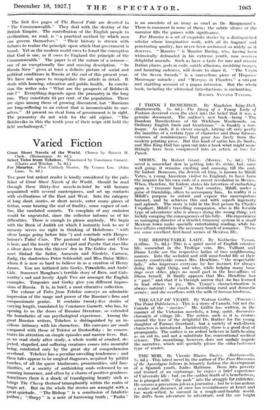Varied Fiction
Great Short Novels of the World. Chosen by Barrett H. Clark. (Heinemann. 8s. 6d.).
Select Tales from Tchehov. Translated by Constance Garnett. (Matto and Windus. 7s. 6d.) Tax poor but ardent reader is kindly considered by the pub- lisher of Great Short Novels of the World. Should he read through these thirty-five novels-in-brief he will become acquainted with several masterpieces, and set up contacts with civilizations of the East and West. Into the category of long short stories, or short novels, enter many pieces of fiction, some bearing the seal of finality, some vaguer of out- line, like caudated sonnets. To complain of any omission would be ungrateful, since the collector informs us of his difficulties. There is enough to please anybody. We begin with the Book of Judith (at which I instantly look to see if memory serves me right in thinking of Holofernes "with silver lamps going before him ") and conclude with Herges- heimer's Tubal Cain. The pastoral of Daphnis and Chloe is here, and the lovely tale of Cupid and Psyche that rises like a silver dove from the thieves' den in The Golden Ass. You meet Sinbad the Sailor, Aucassin and Nicolete, Carmen, Zadig, the shadowless Peter Schlemhil, and Miss Daisy Miller, whom it is now so hard to believe in as a creation of Henry James. You are initiated into Gorky, Pirandello, and Andre Gide. Somerset Maugham's terrible story of Rain, and Gals- worthy's sad and lovely Apple Tree are amongst the English examples. Turgeniev and Gorky give you different impres- sions of Russia. It is, in brief, a most educative collection.
The volume of Tales from Tchehov conveys an admirable impression of the range and power of the Russian's firm and compassionate genius. It contains twenty-five stories of varying length, translated by Constance Garnett, who has, by opening to us the doors of Russian literature, so extended the boundaries of our psychological experience. Among the great Russian writers, Tchehov is distinguished by an in- sidious intimacy with his characters. His canvases are small compared with those of Tolstoi or Dostoeffsky : he concen- trates his attention on simple episodes and narrow lives. But, as-. we read study after study, a whole world of crushed, de- jected, stupefied, and suffering creatures comes into mournful being, comforted only by the great sky of comprehension overhead. Tehehov has a peculiar unveiling tenderness ; and these tales appear to be surgical diagnoses, acquired by pitiful touches, of all the queer kindnesses, promiscuities, odd fam- iliarities, of a society of unthinking souls redeemed by an amazing innocence, and often by a charm of positive goodness. Sometimes there is a shock of transfiguring beauty such as brings The Cherry Orchard triumphantly within the realm of tragic art. But on the whole the stories are wrought with a great clVietude._ _ "The Bishop" is a conclusion of fatalistic pathog ; Sleepy " is a note of harrowing truth ; "Pasha.'
is an anecdote of an irony as cruel as De Manpassant'S There is comment in none of them: the subtle silence of the narrator fills the pauses with significance.
For Maurice is a set of exquisite stories by a distinguished scholar whose imaginative work, with all its fragrant and penetrating quality, has never been acclaimed so widely as it deserves. " Maurice " is Maurice Baring, who, having been whimsically defrauded in his extreme youth, now receives delightful amends. Such as have a taste for rare and remote Italian places, gods in exile, subtle allusions, ravishing images, and haunting cadences, will desire to share it. "The Virgin of the Seven Swords" is a marvellous piece of Hispano- Mauresque miracle.; and "Marsyas in Flanders" a unique and startling account of a pagan intrusion. But the whole book, including the whimsical Introductions, is enchanting.
RACHEL ANNAND TAYLOR.










































 Previous page
Previous page